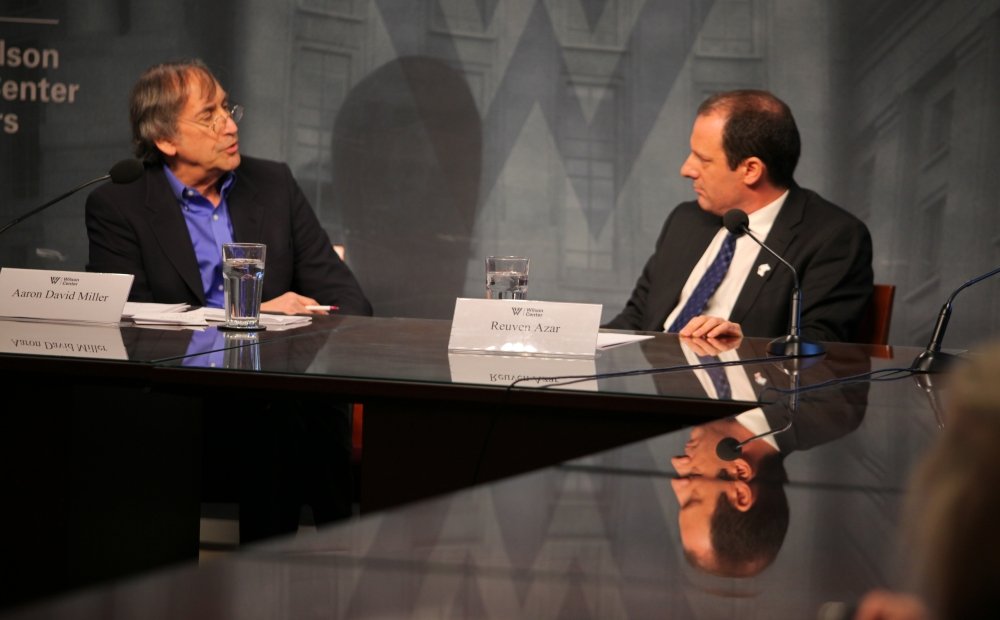The View From Israel: A Conversation with Reuven Azar, Deputy Chief of Mission, Embassy of Israel

Reuven Azar, Deputy Chief of Mission for the Embassy of Israel in Washington, D.C., discussed various issues facing Israel, including the Iranian nuclear deal, the feasibility of a two-state solution, and U.S.-Israeli relations during the Trump administration.
On March 9, 2017, the Middle East Program at the Woodrow Wilson Center hosted the event “The View from Israel: A Conversation with Reuven Azar, Deputy Chief of Mission, Embassy of Israel” with Azar. Aaron David Miller, Vice President for New Initiatives, Woodrow Wilson Center, moderated the event.
After introducing the aforementioned issues and highlighting the need to strengthen bilateral relations, Miller asked how Azar would define these challenges. Azar responded that major current challenges are Sunni and Shi’a extremism, dysfunctional states in the region, a lack of resources, and climate change. Israel’s relationship with the Arab world remains dichotomous, Azar noted, because regional partners, despite common interests, are averse to exposing their working relationships with Israel. Miller asked if Israel developed functional relationships in the region after historical denial from Arab states. Azar answered affirmatively, saying that the transformation in Arab states’ relationships with Israel was independent from Israeli actions. Experts historically believed that the Israeli-Palestinian conflict was the main issue in the region, but Azar believes the Arab Spring disproved this because the dysfunction in the region has risen after the 2011 and 2012 demonstrations.
Miller next asked how the Israel-U.S. relationship will progress under the Trump administration. Azar stated that a change in tone has occurred after President Trump’s inauguration, and engagement has begun. He also said that different approaches to various issues are normal; for example, ISIS is the main focus of the Trump administration, while Iran, with its proxies and nuclear program, is an existential threat to Israel. When asked to expand on the Iranian nuclear deal, Azar indicated that the deal is unsatisfactory because it allowed Iran to retain some nuclear capabilities. The missile program is synonymous with the nuclear program, he stated, which necessitates a response to that as well. Azar suggested both economic sanctions, which have previously proven to be effective, and diplomacy to further pressure Iran to cease its missile program. He said consultation with the administration regarding pushback against Iranian efforts should be pursued.
Miller next asked what options were available to improve the environment surrounding discussions on a two-state solution. Azar quickly responded that Israel is not opposed to negotiations, citing Palestinian refusal to engage in constructive dialogue. Palestinian negotiators must desire progress and have realistic expectations in discussions, he noted.
Azar then responded to audience questions. For example, he stated that a special working group will not be developed to resolve issues between settlers and Palestinians because Israeli law enforcement recently increased its manpower. Azar claimed that the recent law prohibiting principal drivers of the Boycott, Divestment, and Sanctions (BDS) movement entry into Israel does not weaken Israel’s image—the issue requires negotiations between Israelis and Palestinians. He said there is friction between the political wing and the military wing of Hamas; the military wants to attack Israel, while the political wing seeks greater Arab unity. Economic pressure is effective vis-à-vis bringing Iran to the negotiating table, Azar said; other strategies include undermining proxies and stopping weapons shipments. Lastly, Azar noted that there currently are two national movements: the Jewish national movement and the Palestinian national movement. Israel has no interest in incorporating the Palestinian population into its own, because Azar claimed that few Israelis truly support a one-state solution.
By Jack Durkee, Middle East Program
Speaker
Moderator

Hosted By

Middle East Program
The Wilson Center’s Middle East Program serves as a crucial resource for the policymaking community and beyond, providing analyses and research that helps inform US foreign policymaking, stimulates public debate, and expands knowledge about issues in the wider Middle East and North Africa (MENA) region. Read more
